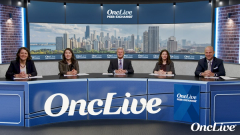
Opinion|Videos|June 24, 2024
Role of Antibody-Drug Conjugates in NSCLC Treatment: Insights from EVOKE-02
Benjamin Levy, MD, leads discussion on the promising potential of antibody-drug conjugates (ADCs) in treating non-small cell lung cancer (NSCLC) with non-actionable mutations, while Helena A. Yu, MD, presents an overview of the EVOKE-02 study, emphasizing key efficacy and safety data that could significantly impact the current treatment landscape.
Advertisement
Episodes in this series

- Briefly discuss the potential role of ADCs in NSCLC with non-actionable mutations.
- What is the rationale for use of ADCs in this treatment space?
- What characteristics may allow ADCs to be more advantageous in this treatment space over other traditional chemotherapy and targeted agents?
- Which ADCs are most likely to have potential benefit here and why?
- Please review the rationale and study design for EVOKE-02 and discuss key efficacy and safety data and the implications these findings may have on the treatment landscape. (
Garon, et al. J Clin Oncol, 2022 ;Cho, et al. WCLC 2023 ;Cappuzzo et al. WLC 2024. Efficacy results by histology from the EVOKE-2 study ;ASCO 2024 Patel et al. SG + Pembro in 1L mNSCLC with PD-L1 ≥50%: Cohort A of EVOKE-02) - What do data demonstrateregarding the efficacy of SG + pembro in patients with NSCLC and how does response differ by PD-L1 expression?
- Other key takeaways? What implications could these findings have on clinical practice?
- Which patients stand to benefit the greatest from this treatment approach?
Advertisement
Latest CME
Advertisement
Advertisement
Trending on OncLive
1
Single-Center, Retrospective Data Show Low Rate of Lifileucel Infusion Following Referral in Advanced Melanoma
2
Outcomes With Bridging Therapy Correlate With Cilta-Cel Efficacy, Safety in Multiple Myeloma
3
Real-World Data Support Clinical Benefit With Lifileucel in Previously Treated Advanced Melanoma
4
Long-Term Cilta-Cel Data Show Low Rates of PFS Events in Standard-Risk R/R Myeloma
5





































